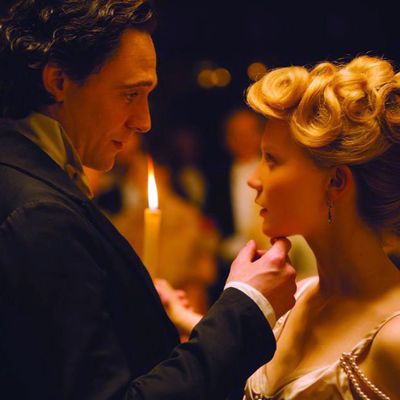
“Ghosts are real,” are the first words uttered in Guillermo del Toro’s pseudo-Gothic, pseudo-horror, pseudo-romance fever dream Crimson Peak. Not long after that, we see our heroine, aspiring author Edith Cushing (Mia Wasikowska), explain a short story she’s written to a prospective publisher. “It’s not a ghost story,” she assures him. “More a story with ghosts in it. Ghosts are a metaphor for the past.” One doesn’t need to read too much into the movie to understand that del Toro intends that as his own statement of artistic principle as well. But that’s both the problem and the wonder of Crimson Peak: It features lots of ghosts, but isn’t really a ghost story. It speaks a lot about romance, but isn’t really a romance. It gives us the structure of a mystery, yet has very little mystery in it. It isn’t even all that haunted by the past, despite that whole line about ghosts as metaphors. It doesn’t always seem to know what it wants to be. But it’s still full of marvels.
When we first meet her, Edith (her last name likely a nod to the great Peter Cushing, star of many classic Hammer horror films — a key Crimson influence) is an outspoken, independent young woman living in Buffalo, New York, frustrated by the fact that whenever she tries to get her work published, her gender gets in the way of her being taken seriously. One day, however, into her workplace walks Baronet Thomas Sharpe (Tom Hiddleston), who immediately takes an interest in one of her stories. (His glance at her first page is so quick, however, that it seems clear he couldn’t possibly have read anything.) An engineer with a mind for elaborate inventions, he’s dreamy and sensitive and haunted. He also has a sister, Lucille (Jessica Chastain), who’s bolder and tougher than he is, who has very little time for social niceties. The English Sharpes are the toast of Buffalo society, but Edith’s banker father (Jim Beaver) sees through them — to their outdated, dusty clothes, to their nervousness. He can tell these purported nobles are at the end of their rope, and he takes the Sharpes to be irresponsible moochers. Unfortunately, Dad’s opinion becomes a nonissue soon enough, and Edith follows her heart, heading with Thomas to Allerdale Hall, the rambling, decaying Cumberland mansion beside which the Sharpes mine for the bloodred clay that seeps through their basement like an insistent heartbeat. And, well, let’s just say things go downhill from there.
As a narrative, Crimson Peak feels both saggy and impoverished — which must be some sort of accomplishment, since stories tend to sag under the weight of too much incident or too many loose ends, not their own emptiness. And for better or worse, del Toro doesn’t seem interested in telling a story here: He doesn’t complicate his setup or give us any turns to keep us interested along the way. It’s not that the story is predictable, it’s that the story can’t even bother to be predictable. Del Toro may be harkening back to Gothic romances, Hammer horror, and Roger Corman’s Poe films, but those stories found ways to surprise us even as they indulged in genre conventions. Here it all feels woefully predetermined. (One big revelation at the end is so obvious that it’s probably not even fair to call it a revelation.)
There’s an imbalance in the performances, too. Wasikowska gives Edith a plucky, forthright charm at first, but as her character becomes more and more a vessel for us to explore the world of the Sharpes and Allerdale Hall, she shrinks as a presence — in part because she spends so much of the movie horrified or sick or outraged. Beautiful, soulful Hiddleston does what he can with the wan Thomas, but the fact that del Toro can’t seem to write men gets in the way; I was constantly reminded of the experience of watching Pacific Rim, and realizing that the film should have centered on Rinko Kikuchi’s story all along. Speaking of Pacific Rim, Charlie Hunnam is here, too, playing an adoring friend of Edith’s who makes way for Thomas, and he seems about as lost here as he did in the earlier film. Chastain, on the other hand, acts literal and figurative circles around everyone else — ruthless yet passionate, her Lucille is an animalistic, physical force. She owns the film’s final act, and her energy lifts the movie up — but it also makes everyone else seem paler and smaller.
Crimson Peak is a fascinating conundrum of a movie. I was close to hating it as I walked out of the theater, but images and moments from it have stayed with me. I keep thinking about the designs of the ghosts Edith keeps seeing, with little ribbons of skin floating off them into the ether. I keep thinking about the characters’ billowing robes as they sprint through the crumbling mansion’s halls. I keep thinking about that gushing, gory, blood-soaked finale – not so much in what happens in it so much as the gushing-gory-blood-soaked-ness of it all. Maybe del Toro doesn’t give us depth. But what he does give us is atmosphere, color, texture, and whirlwind camera moves. You can lose yourself in the film’s spaces, in the characters’ costumes; hell, you can lose yourself in their hair. The film is so rich visually that you kind of forget about its revoltingly underbaked story after a while. Crimson Peak is not so much Gothic as it is Baroque; its artistry lies in its excessive ornamentation. That won’t be enough for some. And for others, it will be everything.





